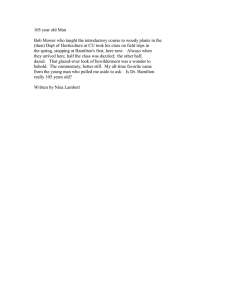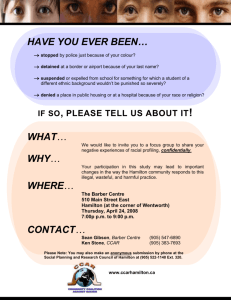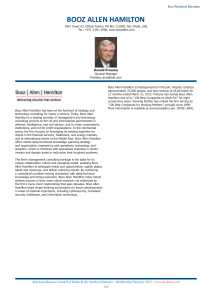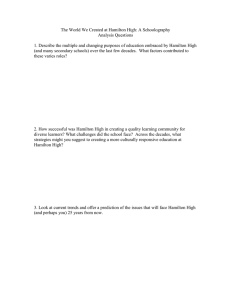school context statement - Hamilton Secondary College
advertisement
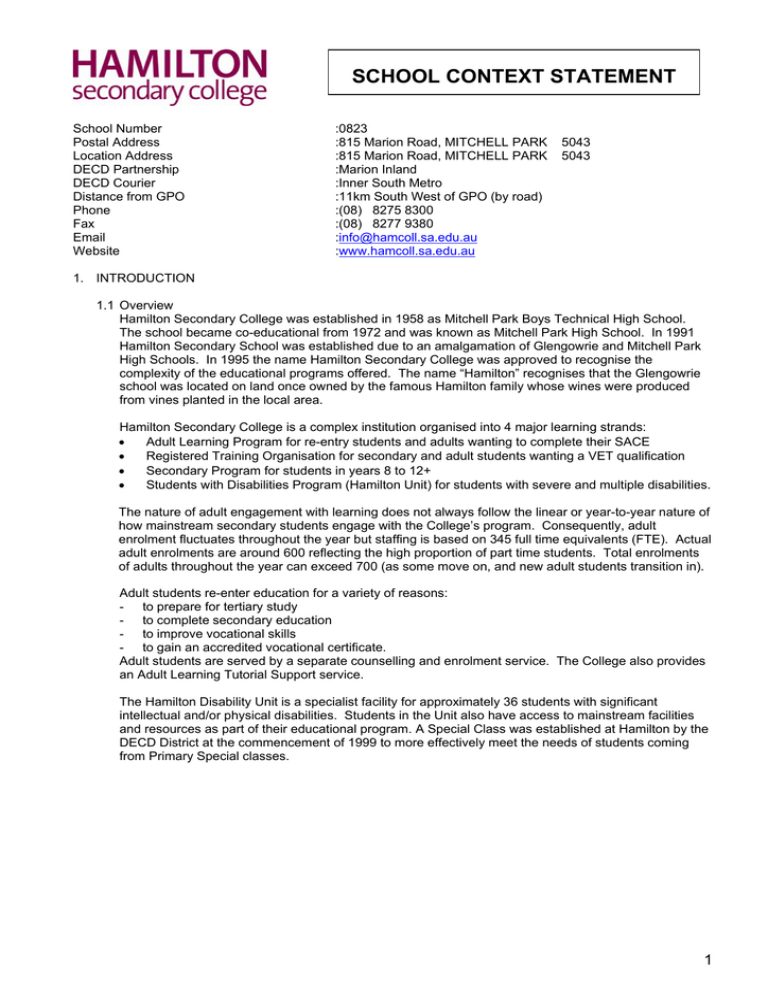
SCHOOL CONTEXT STATEMENT School Number Postal Address Location Address DECD Partnership DECD Courier Distance from GPO Phone Fax Email Website :0823 :815 Marion Road, MITCHELL PARK :815 Marion Road, MITCHELL PARK :Marion Inland :Inner South Metro :11km South West of GPO (by road) :(08) 8275 8300 :(08) 8277 9380 :info@hamcoll.sa.edu.au :www.hamcoll.sa.edu.au 5043 5043 1. INTRODUCTION 1.1 Overview Hamilton Secondary College was established in 1958 as Mitchell Park Boys Technical High School. The school became co-educational from 1972 and was known as Mitchell Park High School. In 1991 Hamilton Secondary School was established due to an amalgamation of Glengowrie and Mitchell Park High Schools. In 1995 the name Hamilton Secondary College was approved to recognise the complexity of the educational programs offered. The name “Hamilton” recognises that the Glengowrie school was located on land once owned by the famous Hamilton family whose wines were produced from vines planted in the local area. Hamilton Secondary College is a complex institution organised into 4 major learning strands: Adult Learning Program for re-entry students and adults wanting to complete their SACE Registered Training Organisation for secondary and adult students wanting a VET qualification Secondary Program for students in years 8 to 12+ Students with Disabilities Program (Hamilton Unit) for students with severe and multiple disabilities. The nature of adult engagement with learning does not always follow the linear or year-to-year nature of how mainstream secondary students engage with the College’s program. Consequently, adult enrolment fluctuates throughout the year but staffing is based on 345 full time equivalents (FTE). Actual adult enrolments are around 600 reflecting the high proportion of part time students. Total enrolments of adults throughout the year can exceed 700 (as some move on, and new adult students transition in). Adult students re-enter education for a variety of reasons: - to prepare for tertiary study - to complete secondary education - to improve vocational skills - to gain an accredited vocational certificate. Adult students are served by a separate counselling and enrolment service. The College also provides an Adult Learning Tutorial Support service. The Hamilton Disability Unit is a specialist facility for approximately 36 students with significant intellectual and/or physical disabilities. Students in the Unit also have access to mainstream facilities and resources as part of their educational program. A Special Class was established at Hamilton by the DECD District at the commencement of 1999 to more effectively meet the needs of students coming from Primary Special classes. 1 1.2 Staffing Principal: Peter Mader (2008 - 2015) Principal classification A-9 (PC09) Deputy Principal: Roger Hooper (2012 – 17) Classification B-6 (PC05) Portfolio includes: Quality Systems & Literacy across the Curriculum Assistant Principals (B-3) Kim Benseman (Year 9 Management and H&PE) Brian Eacott (Hamilton Unit & Students with Disabilities) Andrea Grear (Year 10 Management and English / ESL / LOTE) Lee Knight (Year 8 Management and Humanities) Heather Thomas (Registered Training Organisation / VET Program) Peter Tucker (Adult Education & The Arts) Rod Yon (*The Inner South Metro Trade School and Design & Technology) There is a system developed that provides curriculum leadership across Years 8 – 12 and to better develop coherent approaches to teaching and learning. There is also emphasis to connect these learning experiences to careers and vocations consistent with the nature of the curriculum and our understanding of the innovative 21st C workplace. *Hamilton Secondary College is the Administration Centre for the Inner South Metro Trade School for the Future. Teachers: Including the above, the HR Profile for teaching staff in 2014 was: - Secondary and Adults 60.0 - Disability Unit 5.9 Support Staff for 2014 - Secondary and Adults - Disability Unit 586 272 hours per week hours per week 1.3 Enrolments (February Census FTE) Year 8 Year 9 Year 10 Year 11 Year 12+ Special Class Disability Unit Adults FTE Adult Head Count 2009 2010 85.0 72.0 75.2 65.0 83.6 11.0 35.0 532.2 89.0 99.0 69.0 82.17 68.0 12.0 37.0 556.8 2011 71.0 90.0 89.8 98.9 77.2 10.0 37.0 593.5 2012 74.00 75.00 91.30 103.95 97.41 11.00 37.00 318.26 2013 1242 1270 1112 632 85.00 84.20 97.07 135.74 106.51 11 34 259.58 493 FLO School Card % Secondary Adult Disability Unit NESB Aboriginal Mainstream disability 69 28% 33% 43% 11% 0.8% 4% 13.7% 0.7% 9.6% 23% 33% 33% 27% 66% 46% 20% 56% 48% 10% 1% 15% 10% 2% 13% 16% 2.6% 7% *Two key factors impacting on enrolments for the College are the expansion of Brighton Secondary School (increase of 250 enrolments – commencing in 2014) and the changes to the DECD Adult Education Policy effective from 2012. 1.4 College Priorities The College Improvement Plan (2012 – 14) can be accessed from the following pathway: http://www.hamcoll.sa.edu.au/docs/SiteImprovementPlan.pdf Priorities for 2014 include: 21st Century Learning – focus on the 21st C Fluencies (and emphasis on student-centred / project-based inquiry including STEM Project activity) The Future of Work – focus on the 21st C Fluencies (and connection with industry) Continued development of the Australian Curriculum 2 Roundtable Assessment exhibitions (Years 8 and 9) Improved literacy (focus on Writing) Improved numeracy (focus on Thinking and interpreting questions) Inner South Metro Trade School for the Future in collaboration with Thebarton Senior College, Urrbrae Agricultural High School and 7 other secondary schools. 1.5 Key College Policies/Procedures Assessment and Reporting Attendance Behaviour Bullying and Harassment Computing Drugs and Alcohol Family Charter Grievance Procedure Homework Keeping Students Safe Uniform. 2 SPECIAL ARRANGEMENTS 2.1 The College operates a timetable that includes evening classes for adults 3 nights per week, Tuesdays to Thursdays. Adults enrol in day and evening classes that are separate from those offered to students in years 8-11. The exception to this is at Stage 2 where continuing students and adults share classes, each group benefiting from the variety of options enabled by such a large enrolment. (In 2014, a handful of Year 11 classes have had to combine adult and secondary students to keep curriculum options open.) 2.2 Special consideration is given to students who are involved in the gym program associated with Ascot Park Primary School. An individual timetable arrangement is made to enable these students to participate in competitions and training. Hamilton Secondary College continues to develop a close working relationship with our main feeder Primary Schools (Clovelly Park, Marion, Forbes and Ascot Park) through the Marion Inland cluster partnership. 2.3 Hamilton is a hub for VET activity across the region. Most of our VET programs for regional access are run on a Thursday. Hamilton’s SACE students have limited general lessons on Thursdays unless they are doing a VET course. 2.4 Hamilton Secondary College, in partnership with Thebarton Senior College and Urrbrae Agricultural High School, operates a consortium to provide leadership for a Trade School of the Future, (which serves the needs of 10 secondary schools). Two apprenticeship brokers support the Trade School and their role is to expand the number of Australian School Based Apprentices in the local region, working with surrounding schools, other education providers (including Registered Training Organisations) and Industries experiencing labour market shortages. The 0.5 Assistant Principal; Trade School works closely with the Principal Consortium to deliver this service. 3 STUDENTS 3.1 Pastoral Care The Year Level Managers have the oversight of the College Pastoral Care program or Mentoring Program for their specific year level, and work cooperatively to ensure efficiencies are made. The Year Level Manager’s role is to support care group teachers and their students in achieving the College targets associated with attendance and achievement, as well as addressing the need for a positive and optimistic work culture. The Pastoral Care or Mentoring Program is delivered by Care Group teachers (who work in pairs at Year 8). Pastoral Care is provided to adults via adopt-a-line visits, tutorial support, and special needs sessions delivered by Hamilton staff. These approaches are supported by a Coordinator; Adult Learning and a designated Counsellor. 3.2 Student Support Students are supported by 3 Counsellors, a Careers Adviser and a subject counselling team for course, career and personal counselling. The College has the services of two Christian Support Workers (who also function as Youth Workers). A Learning Support Team provides Curriculum support to adult learners. Indigenous students are supported by the Aboriginal Education Teacher, an Aboriginal 3 Community Education Officer and a Youth Worker. Scholarships are available for eligible indigenous students and a tutorial assistance scheme is available to support their learning. There are a variety of Mentoring Programs to support students, particularly in the middle school where they may be at risk of leaving school early. The INSPIRE program involves students from Flinders University working with selected middle and senior school programs. Since 2008 Hamilton Secondary College has been involved in a Teacher Mentor program to support Year 12 students to persevere with their final year of schooling, and to work with students at risk of leaving in years 10-12. 3.3 Student Management A strong and clear Behaviour Management Policy supports all learning. The focus is on students having opportunities to improve their behaviour through a points system. The Year Level Managers oversee this system and manage both the Rewards Program and the Detention System. At Hamilton Secondary College every person should expect to be able to work and learn in a safe, caring and orderly environment which is success-oriented and free from all forms of harassment. Students exercise choice about their behaviour, and are therefore responsible for the consequences of their behaviour. The values underpinning these expectations are based on mutual respect, self discipline, shared responsibility and cooperation. A Behaviour Management Room operates for students to reconsider inappropriate behaviour. The Assistant Principal; Adult Education oversees issues relating to adult students and counselling support is offered to students should behaviour be a concern. 3.4 Student Government In the secondary program the focus is on supporting Year Level Student Committees to increase student involvement. Each Care Group elects 2 class representatives. These form the Year Level Committees. Representatives elected from each year level form the College ‘Student Voice Executive’, an active and high profile council. Elections are held each year following the Federal electoral model. Student Voice represents a whole College approach to student involvement and makes the link with Year Level Committees. Student Voice has Action Plans for College Improvement, Community Involvement and Sustainability. There is an Adult Student committee which acts as a forum for the discussion of adult issues and works to promote community within the adult student group. It focuses on social and community-building events for adult students. Secondary students and Adult students have representation on the College Governing Council. 3.5 Special Programs The College offers a range of programs and initiatives to support student learning including an extensive Transition Program for students going into Year 8, a Peer Support program where Year 11s work with Year 8s and a CHALLENGE program for students with above average literacy and numeracy skills. The Adaptive Vocation Education Course (AVEC) provides an opportunity for students to experience a broad range of vocational and life experiences as a means of accelerating their transition from school-to-work. Hamilton Secondary College is a Registered Training Organisation offering a wide range of Vocational Courses. A large number of staff are trained and deliver VET courses. There is a strong focus on Screen and Media where programs are delivered at Certificate IV (Animation), and Diploma and Advanced Diploma (Film Making). Examples of other special programs include Australian Business Week and Duke of Edinburgh Award. Hamilton Secondary College has a growing international program with annual visits by student groups from Japan and South Korea. Individual students visiting from other countries are included in the College’s mainstream program. The international program is managed by a teacher who has 0.2 release time. 3.6 Off-site Programs There are approximately 300 Flexible Learning Options enrolments managed by the Coordinator; Alternative Programs. Most of these students are enrolled through Hamilton into specialised and personalised programs operating in the local community – Campbell Page, Mission Australia and Workskill – but approximately 33% of the enrolments elect to do a mainstream program at the College. 3.7 Sporting Activities Sport forms an integral part of a student’s school life, balanced with academic and social activities. Summer Sports include Cricket, Tennis, Athletics, Beach Volleyball, Softball, Basketball, Korfball, Cycling and Triathlon. Winter Sports are Football, Soccer, Basketball, Netball, Cross-country, Table tennis, Badminton and Hockey. Other sports are available and are dependent on student interest. The inter-school Sport program is managed by a staff member who has 0.2 release time. 3.8 Other Co-curricular Activities Camps and Excursions, College Ensembles, Assemblies, The Arts Showcase, which includes Dance, Music and Fine Arts productions, International exchanges to Japan and Korea, Australian Business Week, Duke of Edinburgh Award scheme and other Community based learning programs (e.g., Ice Factor). 4 4 CURRICULUM 4.1 General Hamilton Secondary College is committed to delivering a curriculum which provides students (from year 8 to Adult Re-entry) with learning opportunities through flexible and relevant programs. With a FTE student population of approximately 700, plus 300 FLO students, from diverse backgrounds in terms of life style, family structure, mobility, socio-economic status and academic potential, the students have access to curriculum which makes provision for varied individual development. The College’s curriculum structure and pedagogy aims to make students’ work relevant, rigorous, challenging, exciting and enjoyable at all levels: middle years, senior years and Adult education. While our secondary school curriculum is organised into a Middle years and Senior years structure, in some Learning Areas students have opportunities to undertake learning programs that are not tied to chronological age or designated year of study, but to meeting challenges appropriate to the individual student at any given point. Teaching, Learning, Assessment and Reporting Since 2008, Assessment and Learning Plans for the 8 Learning Areas have been developed. These plans focus on Learning Area specific strategies, to achieve the highest possible outcomes for all students. The Learning Plans reflect the College strategic directions. This means that the learning outcomes (Australian Curriculum, SACE, VET) are stated in each Unit of Work or Course along with Assessment information which allows students to know the criteria for success at the start of a course. Hamilton Secondary College has a policy that the assessment items in Units of Work are reviewed on a regular basis to ensure they reflect current curriculum developments and the identified needs of the student population. A variety of assessment techniques are expected in each Unit of Work or full year courses to optimise student achievement and cater for the different Learning Styles. The academic progress of each student in each Unit of Work or full year course is rigorously assessed to give a clear and valid picture of what the student has achieved and to identify any weaknesses and areas in need of further growth and development. Student achievement is reported to parents at the end of each Term. Parent Teacher interviews are held at the beginning of Term 2 and year 8 and 9 students present their learning to a panel which includes a parent, twice a year (June and December). Students at Hamilton Secondary College have opportunities to enrich their learning through a variety of ways, including: individual learning support (formal and informal) peer mentoring Individual Education Plans Mentoring Programs Special programs, e.g., Duke of Edinburgh, Ice Factor etc Work Placements Career planning and advice Varied assessment methods Flexible timetabling Challenge class Leadership opportunities Exchange programs Individual or small group tutoring in senior classes. 4.2 Middle Years Program Students in the middle years have a curriculum and teaching methodologies designed to suit the needs of young adolescents in a learning environment which is challenging and supportive of student success. To assist in this, the middle school is structured into small care groups with teachers who may teach in at least one curriculum area. To maximise student progress and by using the broader resources of the College, classes in the middle school are deliberately kept smaller than average. A Pathways pastoral care program is also provided to all students by their care group teachers. Middle school students complete studies in each of the eight curriculum areas with subjects including: English, Maths, Science, Society and Environment, Dance, Art, Music, Japanese, Home Economics, Design and Technology studies, Physical Education and Information Technology. During semester one of each year, all year 8 students are involved in a peer support program led by selected year 11 students whose involvement is programmed as a SACE Stage 1 subject. A Challenge Class program operates at years 8 and 9 to assist in meeting the needs of students with demonstrated strengths in either literacy or numeracy. The College also provides a Learning Assistance Program for students with an Individual Education Plan (IEP) and this can take the form of withdrawal for intensive support in the Learning Centre, in-class support or separate teaching groups. 5 4.3 Senior Years Program Hamilton Secondary College is committed to a senior years’ curriculum which provides Years 10, 11 and 12 with flexible, relevant learning. The courses available allow students to develop pathways and skills for them to meet their individual needs through a pastoral care program serviced by Mentors and Year Level Managers. Parents/caregivers and senior students will be engaged in this dynamic process of using the senior school to construct a successful transition to a future beyond school for each individual. Hamilton offers a broad curriculum with students able to choose from a wide range of subjects to design a course to meet individual needs. Over the senior years students will develop skills in working with others, problem solving and lifelong learning. The curriculum addresses diverse student interests and abilities and provides opportunities for students to be experiencing positive relationships with teachers and with one another while engaging in relevant learning. Students are able to choose from a range of pathways and special programs available. Students may combine a number of different pathways and can gain credit towards multiple awards/qualification studies in the senior school. By careful and guided subject selection, students can: Work in areas of their interest Gain industry accredited qualifications Gain their SACE certificate Qualify for university study with an ATAR (Tertiary Entrance Rank) score. 4.4 Adults The Hamilton Adult program offers a wide range of courses to suit its clients’ needs. These range from educational update courses, for those who have been out of education for some time and need help and revision in getting back into school, to vocational training courses suitable for those looking to enter the work force in specific areas. Adults return to education to Complete their secondary education Prepare for university or TAFE Update work skills Gain an accredited Certificate. The curriculum is divided into broad categories, as described below: SACE Stage 1 (Year 11) Subjects in this category are designed to prepare students for Stage 2 of the South Australian Certificate of Education (SACE). They assume that students have basic study skills and they are gradually brought up to SACE Stage 1 standard. By the end of the courses students should be ready to tackle Stage 2 subjects. Subjects offered include: English, Business Maths, Pure Maths, Physics, Chemistry, Ancient Studies, Art, Astronomy, Journalism, Food Preparation and Psychology. Subjects are usually semester-length, but there are some single-term units, in the Arts and Food for example. Vocational Subjects These are competency based subjects where students gain specialised skills applicable to a wide range of careers. Subjects can be taken separately or as part of one of the College’s Vocational Certificates. Hamilton offers a wide range of Computing subjects as nine-week courses, during the day and evening. These include Word, Excel, Photoshop, Publisher, MYOB and Flash. Other vocational subjects include Manual Accounting, First Aid and Catering. Vocational Certificate Courses Vocational courses are designed for students who have identified a specific career focus and wish to follow an educational pathway towards that goal. The following Vocational Certificates are currently available: Business II BSB 20112 Business Administration III BSB 30412 Community Services (RTO TAFE SA) CHC 20112 Community Services Work III (RTO TAFE SA) CHC 30112 Creative Industries (Media) II CUF 20107 Education & Skills Development I 40650SA Food Processing (Wine) I FDF 10403 Kitchen Operations II SIT 20312 Information Technology II ICA 20111 Information Technology III ICA 30111 Media (Animation) III CUF 30107 Sport and Recreation II SIS 20312 Tourism II SIT 20112 6 Travel III SIT 31312 Engineering II MEM 201015 Diploma/Advanced Diploma Screen & Media (MAPS – Film Making) CUF50107 & CUF 60107 Hamilton is the Registered Training Organisation for most of the certificates listed above. Training is delivered according to the requirements of the various Training Packages under the auspices of the AQTF. Teachers working at Certificate level are required to have Certificate IV in Workplace Training and Assessment and appropriate industry accreditation. SACE Stage 2 studies A wide range of South Australian Certificate of Education Stage 2 subjects are available. In 2014, 26 are taught. Adults and senior secondary students share subjects at this level. Subjects are offered during the day and evening. Evening classes include Accounting, Information Technology Studies, English Communications, Maths Specialist, Research Project, Physics and Psychology. Several of these are not generally available in other high schools and colleges and Year 12 students from other schools are able to enrol in evening subjects in order to maximise their course selection. Adults who are at least 18 on January 1 in any school year and who have had a break of one year in their schooling are not required to complete Stage 1 to achieve the SACE and an ATAR. Most adults enrolling as SACE students at Hamilton enrol only as Stage 2 students. Preparation for Stage 2 occurs in Stage 1 classes for those adults who have not had recent experience of schooling at Year 11. For many adults the completion of the full Stage 2 program of 5 subjects is difficult due to family and work commitments. These students may enrol in 2 or 3 Stage 2 subjects and then enter university by sitting the STAT. It is not uncommon for adults to take one or two Stage 2 subjects alongside a couple of Stage 1 subjects and some short courses in computing. The curriculum enables this kind of mix and adults appreciate the opportunity to study at the level appropriate to their experience. 4.5 Disability Hamilton Secondary College caters for the individual learning needs of all students who have learning difficulties or intellectual and physical disabilities. This is usually achieved through an individualised Negotiated Education Plan which identifies learning goals within the Australian Curriculum and the South Australian Certificate of Education (SACE). These ensure that all students are offered a balanced curriculum, with an appropriate focus on skill development and academic achievement. Students with disabilities or learning difficulties are supported either in a mainstream context or by placement in the District Special Class. In the mainstream context, students receive either access to small group instruction or, by negotiation, can receive SSO support in their classroom. In the District Special Class students have the benefit of a very small class (maximum of 12 students) and SSO support. The Hamilton Disability Unit caters specifically for the learning needs of students with intellectual and physical disabilities. At the age of fifteen, these students are enrolled in the SACE program and they usually complete 110 Stage 1 credits over a period of four years. The Hamilton Unit does not offer Stage 2 credits in SACE, and for this reason, students do not complete the full SACE. However, their achievement in completing SACE Stage 1 credits is acknowledged through a Record of Achievement from the SACE Board. Enrolment does not normally continue beyond the completion of the Stage 1 credit. The Hamilton Unit staff also negotiates mainstream access for individual students and whole class groups. Mainstream curriculum areas may include Home Economics, Art, Computing, Technology Studies and Physical Education. Hamilton Secondary College encourages all students with disabilities to become as independent as possible, and students are given opportunities to develop their communication and social skills. During the final years of schooling, all students have the chance to undertake a range of work experience placements in order to maximise their post-school options. These usually include work experience in open employment, supported employment or Day Options programs depending on student need. Students in the District Special Class and the Hamilton Unit are offered a varied program of physical and community based activities which can include: weekly swimming sessions integration in mainstream aquatics technical studies Duke of Edinburgh Award sporting events camps. 7 Enrolment in the Hamilton Unit and the District Special Class is through a placement process which is coordinated by the DECD and not by the College. 5 STAFF 5.1 Profile There are approximately 50% male teachers and 50% female teachers with more than 10 teachers being part time. The average age of the teaching staff is 52 years. 1 teacher is Advanced Skills Teacher Level 2 43 teachers are Step 9 Many teachers are qualified to deliver training in a large number of vocational courses. They are required to also have appropriate industry training and Certificate IV in Training and Assessment or equivalent. Because of the high level courses delivered, the College extensively uses the services of Hourly Paid Instructors to deliver aspects of vocational programs. 5.2 Leadership In 2014, the Leadership Team comprises: Principal, Deputy Principal, 7 Assistant Principals and 9 Coordinators, 3 of which are student counsellors (2 for continuing students and 1 for Adults). The remaining Coordinators have a project role. The Hamilton Unit has a leadership team of 1 Assistant Principal and 1 Coordinator. 5.3 Staff Support Significant emphasis is placed on staff training and development, including Professional Learning Communities which operate on Monday mornings.. All staff have access to the Staff Handbook and new staff are involved in an induction program. There is an active Staff Association. All staff have access to consultation and decision making forums and there is the opportunity to be involved in a number of committees. A supportive behaviour management process is in place. 5.4 Performance Development At Hamilton Secondary College performance development is manifested in Professional Learning Communities where teams of teachers focus on a “common compelling question”. This is an inquiry question that trials changes to practice; collection of data, and presentation of findings. 5.5 Additional staff The support staff positions employed within the College are diverse in nature and incorporate a wide range of work areas including administration, students services, finance, facilities, grounds maintenance and security. In addition positions that directly support the work of teachers include direct classroom support for students with challenging behaviours or other services such as library, laboratory, computer technology. The Hamilton Disability Unit has additional formula hours of support for its students with extra hours from the Special Education Resource Unit for transport support. Around 60-80 hours of additional ancillary staff are employed above entitlement to service the demanding and growing needs of the College. Hourly Paid Instructors support the delivery of the curriculum. The College uses Instrumental Music teachers to support the Music program. 6 FACILITIES 6.1 Buildings and Grounds The College maintains a program of continual upgrading of its facilities. Hamilton was upgraded in 1991 at the time of amalgamation with Glengowrie High. In 1998 the purpose-built Hamilton Disability Unit was opened. This centre caters for students with significant intellectual and physical disabilities. Four additional classrooms for use by Senior and Adult students have been built and modification of an existing building to provide an identifiable Middle School location has been completed. The Library has had a significant upgrade with the provision of additional technologies and on-line services to provide a level of access to information required for the twenty first century. Improvements have been made to other buildings including the gymnasium and in 2004 a specialist Dance facility was built to accommodate the introduction of Dance into the curriculum. In 2006 the Home Economics Centre underwent a substantial upgrade with Specialist Textiles, Domestic and Commercial kitchens being established. A further upgrade to Skills Centre Status was completed in 2010. In 2010 and 2011 the Design and Technology buildings were upgraded to Trade Training Centre Standards. In 2012 the College’s Administration Centre was upgraded. The grounds are well maintained, with automatic watering systems installed as well as use of bore water. Students have access to shaded, sheltered areas with adequate outdoor seating areas. The Cafeteria is well appointed, with indoor seating for senior and adult students. All buildings are alarmed, including smoke detectors and monitored by Police Security. Perimeter gates are locked in the evenings and on weekends. Ample lighting, security cameras and regular after-hours patrols add to the safety of the site. Minor works have been funded to support improved use of space as per our role in 8 hosting the Trade School. In 2012 a major upgrade was undertaken of administration and reception areas, adult facilities and counselling offices. 6.2 Cooling All teaching and learning areas are air-conditioned. 6.3 Specialist facilities Adult and continuing students are attracted to Hamilton because of the high quality facilities offered. A $4 million upgrade in 1991 involved the building of new Science, Music and Art complexes and restructuring of Technology Studies facilities. The College has a computer network with integrated Admin and curriculum functions. The Fibre Optic backbone extends this to all parts of the College, and we have recently contracted high speed, large data capability through iFibre and Internode. All staff offices and most classrooms have access to the computer network, with all staff having work stations kitted with either a desktop or lap-top computer. Students have a 1:1 laptop in Years 8-11 and other students can borrow a laptop from the Library. The College has excellent facilities for education in the Arts with a special focus on Animation, Film and Video, and Multimedia. Student conference and presentation rooms have been developed for Middle, Senior and Adult Students. State of the art corporate facilities exist for computer animation courses with the recent addition of an additional multi-media suite catering for Cel Animation, Claymation, 2 and 3D Animation and Digital Photography, as well as a Middle School Arts area. 6.4 Student facilities There is an on-site cafeteria, automated library (generally open until 6:30pm) and specialist catering facilities for training for the Hospitality industry. Students have continuous access to technology. Adult students have a separate lounge, kitchen facility and toilets, and a student study area with computer facilities. There is a video conference facility to enable students and staff to conference world wide. 7 COLLEGE OPERATIONS 7.1 Decision making structures The College Governing Council has a membership of 18, which includes 8 elected parents or adult students, 2 staff, 2 continuing students, 3 community members and the principal, the Local Member of Parliament and a member of the Marion Council. Council meet twice each term and have members on the Finance Advisory, Policy Review, and Planning and Review Committees. Staff can be involved in decision making through Learning Area meetings, staff meetings and by voluntary involvement in a range of standing committees. The peak decision making body is the Leaders Committee which meets every 2 weeks. Specific task groups operate on a short term basis from time to time, with voluntary membership from staff. 7.2 Regular publications A staff handbook, Adult Course and Information handbook and brochures, Senior Student Course Outline and a College Prospectus are published annually. Daily notices for students and staff are published on the Daymap system. The College newsletter is published twice a term. The Adult Campus Newsletter is published once each term. The Hamilton Disability Unit (Flato Centre) Newsletter is published once each term. An annual report is produced and available on the College website. 7.3 Other communication Parents have access to the Daymap system. Parents and students are consulted through newsletter feedback, survey and interview of students, learning community and year level student committees, parent information evenings and through involvement on committees. The College has a web site. 7.4 School financial position The College finance is managed and monitored via EDSAS which is the DECD financial software package, and operates in accordance with the DECD financial policies and procedures. An Annual Audit is conducted by non government Auditors. A major financial commitment to Technology and significant contribution towards College redevelopments has occurred. 7.5 Special funding The College is very successful when submitting requests for grants on a wide range of projects that supports the students and the curriculum. Funding grants supporting 2014 work include: Advanced Technology Project (Maths, Science and Technology) Student Mentoring Project (Yrs 10-12) ITAS Grant (ATSI Tuition) National Partnerships (Disability) Numeracy Coach 21st Century Fluency Project ($200K grant announced in 2014 State Budget). 8 LOCAL COMMUNITY 8.1 General characteristics: 9 8.2 8.3 8.4 8.5 8.6 8.7 8.8 Hamilton Secondary College caters for secondary students from Mitchell Park, Marion and Ascot Park. Middle School students from Glenelg, Brighton, Hallett Cove and Plympton areas are attracted by the College’s creative arts and technology focus and a broad range of subjects in the Senior Secondary Curriculum. While some adults and senior students come from the local area many choose to travel some distance to access the College’s facilities and learning programs. Approximately 16% of students are from non-English Speaking backgrounds with a growing number of enrolments from African refugees. The College enjoys strong support from the City of Marion. Parent and community involvement The College has a number of volunteers who act as mentors or work in the library. Feeder schools Students travel from many locations but Ascot Park, Clovelly Park, Forbes and Marion Primary Schools are the major feeder schools. The Leaders of most of these schools meet on a regular basis as the Marion Inland Partnership. Other local care and educational facilities Childcare is available on Ascot Park Primary School grounds. Commercial/industrial and shopping facilities Hamilton Secondary College is within walking distance to Park Holme shopping centre, containing a variety of general shops, Commonwealth Bank and Post Office. Westfield Marion is approximately 2kms from the College. Other local facilities Hire facilities include 1 oval, 4 tennis courts, hall/gymnasium suitable for many sports. Facilities are regularly hired to community groups. Accessibility Bus transport is provided on Marion Road – north and south direction, route M44, stops 21 and 22. Train transport is provided on the Seaford line stopping at Marion and Ascot Park stations and the Tonsley Park line stopping at the Mitchell Park station. Government electorates Local – the College is located in the City of Marion State – the College is located in the electorate of Elder Commonwealth – the College is located in the electorate of Boothby 10

